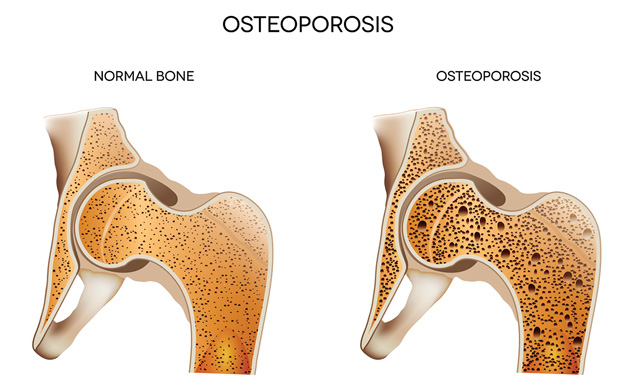Bones are a living material. The body is constantly producing new tissue to replace bone that naturally breaks down. Osteoporosis is a disease that affects the body’s ability to make new bone and maintain adequate bone density, and can cause significant bone loss over time. As a result of osteoporosis, bones become weak and brittle and are prone to breakages.
Osteoporosis Risk Factors
An estimated 10 million Americans have osteoporosis and another 44 million have low bone density, which elevates their risk of developing the disease in the future. Anyone can develop osteoporosis, but women are four times more likely to suffer from the condition than men. Women are at a greater risk for osteoporosis because female bones tend to be smaller and thinner, and because estrogen plays an important role in regulating bone mass. Genetic and environmental factors can also raise a person’s chances of developing osteoporosis. Caucasian and Asian women are statistically more likely to develop osteoporosis, as are people who have a family history of the disease. Menopausal women also have a greater chance of developing osteoporosis since lower hormone production naturally decreases bone production.
Additional factors that are not related to genetics, gender or age can also increase a person’s risk of developing osteoporosis. An inactive or sedentary lifestyle, high levels of alcohol consumption, and smoking tobacco products raises the likelihood of osteoporosis.
Osteoporosis Symptoms and Prevention
 Osteoporosis develops slowly. There are no overt signs of the disease and it is common for women to discover they have osteoporosis only when a bone breakage occurs. Symptoms of osteoporosis are often subtle, but can prompt women to ask their doctors for medical tests. Typical symptoms include stooped posture, gradual loss of height, back pain, and easily incurred bone fractures.
Osteoporosis develops slowly. There are no overt signs of the disease and it is common for women to discover they have osteoporosis only when a bone breakage occurs. Symptoms of osteoporosis are often subtle, but can prompt women to ask their doctors for medical tests. Typical symptoms include stooped posture, gradual loss of height, back pain, and easily incurred bone fractures.
The best way to prevent osteoporosis is to maintain the overall health and strength of your bones. Women can preserve bone health by maintaining a balanced diet rich in calcium and Vitamin D and by participating in moderate, daily exercise. These exercises do not have to be arduous or high impact, but they should focus on weight bearing activities. In additional to diet and exercise, subtle, intentional changes in a daily routine can help maintain bone health. For example, women should take the stairs instead of the elevator, or carry small weights while walking or jogging. Recreational activities such as hiking, dancing, tennis or golf can also be part of an active lifestyle that prevents osteoporosis or helps impede its progression.
Diagnosing Osteoporosis
Women who are at risk for developing osteoporosis may be given a Bone Mineral Density (BMD) test to check bone health. The test is quick and painless, using a low-dose radiation x-ray to check an area of bone for calcium and other mineral levels. The test is usually scored with two metrics, a T-score and Z-score. The T-score compares a woman’s ’s bone density level to that of a healthy, young woman, while a Z-score checks bone density against other women of similar age and ethnicity. A normal T-score is -1.0 or above. T-scores or Z-scores with negative numbers indicate that bones are less dense than average.

Treatment for Osteoporosis
Medications called bisphosphonates can help treat osteoporosis by slowing the process of bone deterioration. These medications do not reverse bone loss, but they do aid in the maintenance of bone density levels, decreasing the likelihood of fractures. Bisophosphonates have relatively few side effects. They can cause heartburn or indigestion, and some people with decreased kidney function should not take them.
Teriparatide is a non-bisphosphonate medication prescribed to treat osteoporosis. It is typically given to people who have exceptionally low bone density or cannot take bisphosphonates due to a health condition. Teriparatide is the only osteoporosis medication that can potentially rebuild bone, with limited results. Teriparatide’s side effects include nausea, dizziness, and joint pain, and may increase the risk of developing osteosarcoma, a rare form of cancer.
Hormone Replacement Therapy (HRT) is another effective treatment option for postmenopausal women struggling with osteoporosis. It is best not to use HRT to treat osteoporosis for a long period of time because of the potential for side effects. including heart attacks, blood clots and certain types of cancers.
Start Preventing Osteoporosis Today
Osteoporosis is a serious disease that can lead to further health complications and detract from a woman’s quality of life. It can cause chronic pain, limit physical mobility, and raise the likelihood of bone breakages that can compromise her overall health. Fortunately, simple steps such as following a healthy, nutrient-rich diet and maintaining an active lifestyle can help prevent or slow the development of osteoporosis. Medications and treatment therapies are also available for people already suffering from the effects of bone loss.
If you are concerned that you may have osteoporosis or be at risk for developing it in the future, talk to your healthcare provider about testing and diagnosis options. Be proactive about your bone health. It is never too early or too late to start making lifestyle choices that can help stop damaging bone loss and prevent osteoporosis.
If you have any questions or concerns about your risk for osteoporosis, or osteoporosis prevention and treatment options, please contact Kansas City ObGyn today at This email address is being protected from spambots. You need JavaScript enabled to view it. or 913-948-9636.






